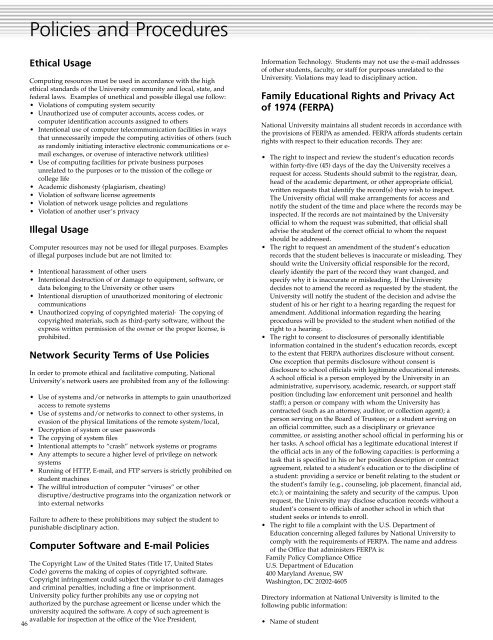Catalog 73 - National University
Catalog 73 - National University
Catalog 73 - National University
- No tags were found...
You also want an ePaper? Increase the reach of your titles
YUMPU automatically turns print PDFs into web optimized ePapers that Google loves.
Policies and ProceduresEthical UsageComputing resources must be used in accordance with the highethical standards of the <strong>University</strong> community and local, state, andfederal laws. Examples of unethical and possible illegal use follow:• Violations of computing system security• Unauthorized use of computer accounts, access codes, orcomputer identification accounts assigned to others• Intentional use of computer telecommunication facilities in waysthat unnecessarily impede the computing activities of others (suchas randomly initiating interactive electronic communications or e-mail exchanges, or overuse of interactive network utilities)• Use of computing facilities for private business purposesunrelated to the purposes or to the mission of the college orcollege life• Academic dishonesty (plagiarism, cheating)• Violation of software license agreements• Violation of network usage policies and regulations• Violation of another user’s privacyIllegal UsageComputer resources may not be used for illegal purposes. Examplesof illegal purposes include but are not limited to:• Intentional harassment of other users• Intentional destruction of or damage to equipment, software, ordata belonging to the <strong>University</strong> or other users• Intentional disruption of unauthorized monitoring of electroniccommunications• Unauthorized copying of copyrighted material· The copying ofcopyrighted materials, such as third-party software, without theexpress written permission of the owner or the proper license, isprohibited.Network Security Terms of Use PoliciesIn order to promote ethical and facilitative computing, <strong>National</strong><strong>University</strong>’s network users are prohibited from any of the following:• Use of systems and/or networks in attempts to gain unauthorizedaccess to remote systems• Use of systems and/or networks to connect to other systems, inevasion of the physical limitations of the remote system/local,• Decryption of system or user passwords• The copying of system files• Intentional attempts to “crash” network systems or programs• Any attempts to secure a higher level of privilege on networksystems• Running of HTTP, E-mail, and FTP servers is strictly prohibited onstudent machines• The willful introduction of computer “viruses” or otherdisruptive/destructive programs into the organization network orinto external networksFailure to adhere to these prohibitions may subject the student topunishable disciplinary action.Computer Software and E-mail PoliciesThe Copyright Law of the United States (Title 17, United StatesCode) governs the making of copies of copyrighted software.Copyright infringement could subject the violator to civil damagesand criminal penalties, including a fine or imprisonment.<strong>University</strong> policy further prohibits any use or copying notauthorized by the purchase agreement or license under which theuniversity acquired the software. A copy of such agreement isavailable for inspection at the office of the Vice President,46Information Technology. Students may not use the e-mail addressesof other students, faculty, or staff for purposes unrelated to the<strong>University</strong>. Violations may lead to disciplinary action.Family Educational Rights and Privacy Actof 1974 (FERPA)<strong>National</strong> <strong>University</strong> maintains all student records in accordance withthe provisions of FERPA as amended. FERPA affords students certainrights with respect to their education records. They are:• The right to inspect and review the student’s education recordswithin forty-five (45) days of the day the <strong>University</strong> receives arequest for access. Students should submit to the registrar, dean,head of the academic department, or other appropriate official,written requests that identify the record(s) they wish to inspect.The <strong>University</strong> official will make arrangements for access andnotify the student of the time and place where the records may beinspected. If the records are not maintained by the <strong>University</strong>official to whom the request was submitted, that official shalladvise the student of the correct official to whom the requestshould be addressed.• The right to request an amendment of the student’s educationrecords that the student believes is inaccurate or misleading. Theyshould write the <strong>University</strong> official responsible for the record,clearly identify the part of the record they want changed, andspecify why it is inaccurate or misleading. If the <strong>University</strong>decides not to amend the record as requested by the student, the<strong>University</strong> will notify the student of the decision and advise thestudent of his or her right to a hearing regarding the request foramendment. Additional information regarding the hearingprocedures will be provided to the student when notified of theright to a hearing.• The right to consent to disclosures of personally identifiableinformation contained in the student’s education records, exceptto the extent that FERPA authorizes disclosure without consent.One exception that permits disclosure without consent isdisclosure to school officials with legitimate educational interests.A school official is a person employed by the <strong>University</strong> in anadministrative, supervisory, academic, research, or support staffposition (including law enforcement unit personnel and healthstaff); a person or company with whom the <strong>University</strong> hascontracted (such as an attorney, auditor, or collection agent); aperson serving on the Board of Trustees; or a student serving onan official committee, such as a disciplinary or grievancecommittee, or assisting another school official in performing his orher tasks. A school official has a legitimate educational interest ifthe official acts in any of the following capacities: is performing atask that is specified in his or her position description or contractagreement, related to a student’s education or to the discipline ofa student: providing a service or benefit relating to the student orthe student’s family (e.g., counseling, job placement, financial aid,etc.); or maintaining the safety and security of the campus. Uponrequest, the <strong>University</strong> may disclose education records without astudent’s consent to officials of another school in which thatstudent seeks or intends to enroll.• The right to file a complaint with the U.S. Department ofEducation concerning alleged failures by <strong>National</strong> <strong>University</strong> tocomply with the requirements of FERPA. The name and addressof the Office that administers FERPA is:Family Policy Compliance OfficeU.S. Department of Education400 Maryland Avenue, SWWashington, DC 20202-4605Directory information at <strong>National</strong> <strong>University</strong> is limited to thefollowing public information:• Name of student
















